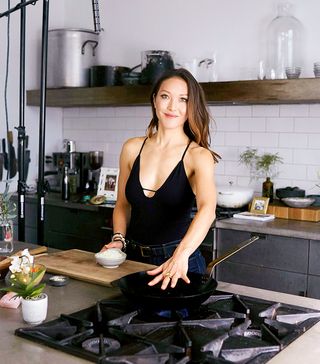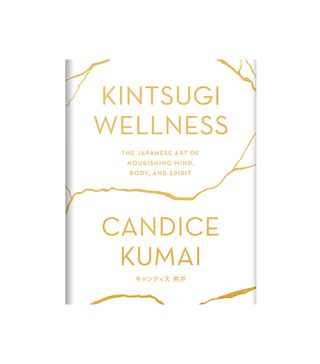How My Japanese Heritage Influences My Wellness Routine

Candice Kumai is a model turned chef and wellness writer—not to mention a five-time best-selling author. She's also a regular judge on Iron Chef America and Beat Bobby Flay. Suffice to say, girl knows her wellness stuff. Candice lives in New York City, and we're thrilled to have her on board as a contributor for THE/THIRTY. She'll be sharing her favorite recipes, mindfulness tips, and more. This month, she shares how her Japanese heritage has shaped her wellness routine.
My Japanese mother taught me about ki yo tsukete, which translates to "take great care and pay attention." She is, to me, the most resilient, bright, and beautiful sensei in life. She is a Japanese language and cultural teacher here in the U.S. and was born in Kyūshū, Japan. Being mindful, resilient, and graceful is the most beautiful thing I've learned from Mom. She is as real as they come and is everything she has taught me.
Mom showed me how to be graceful and resilient—she did not tell me. When you are confident, authentically you, and radiant on the inside, everyone will be attracted to you. Being Japanese-American is the perfect balance to be inspired and to create more inspiration based on heritage to share with others. I learn so much from my ancestors, and it is imperative to share that with the world. I am a bridge, a messenger, and an educator, but above all things, I will forever be a student. I feel honored to share these time-tested traditions with you.

Meditation is key to a balanced mind (and body).
I started to practice in my 20s, and it helps me to reset my mind, stay calm, and better focus in the mornings. I also visit Japan often to study the lifestyle, the food, and the fascinating culture with Buddhist monks. I am so inspired by their daily life and devotion to prayer and simplicity.

Positivity isn't everything.
The Japanese have a unique way of looking at life with a realist perspective, knowing things aren't always going to be great—mono no aware (which translates to "the empathy of things") or wabi-sabi (the acceptance of transience and imperfection) are examples of this.
I have been an editor and writer for many big U.S. health and wellness magazines and had to write on positivity constantly. This isn't always the way the Japanese would look at life. I think the realist approach contributes to more mindfulness and awareness.
We might need to rethink our Western definition of "wellness."
The U.S. focuses on post-treatment and prescription pills, and that's not necessarily the answer to better health and wellness. The Japanese focus on prevention and mental health. They treasure nature, traditionally eat fermented foods, and have an open mind on the world. Here in the U.S., we must educate more on food, nutrition, sleep, less alcohol, and more exercise. Wellness should not cost money—it is technically free to all, and we must teach more of this.

Kumai's latest book, Kintsugi Wellness, dives deeper into the Japanese approach to wellness—think of it like The Life-Changing Magic of Tidying Up for health. Preorder it now.Next up: See what life is really like after winning Olympic gold, according to gymnast Nastia Liukin.
Disclaimer
This article is provided for informational purposes only and is not intended to be used in the place of advice of your physician or other medical professionals. You should always consult with your doctor or healthcare provider first with any health-related questions.

